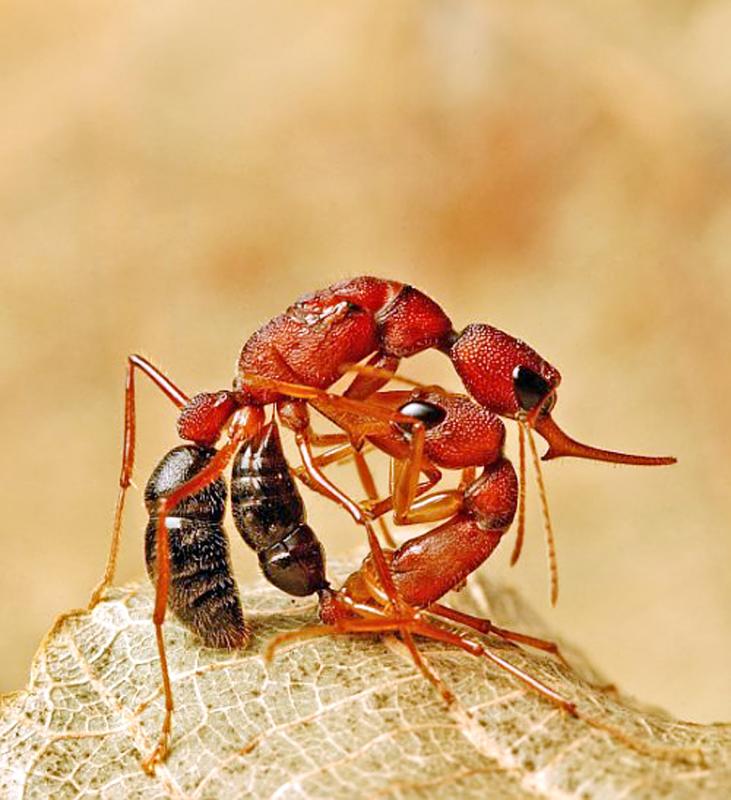Few species in the animal kingdom can change the size of their brain. Fewer still can change it back to its original size. Now researchers have found the first insect species with that ability: Indian jumping ants.
They are like catnip to researchers in the field. In contrast to their cousins, Indian jumping ants colonies do not perish once their queen dies. Instead, “chosen” workers take her place — with expanded ovaries and shrunken brains — to produce offspring. But, if a worker’s “pseudo-queen” status is somehow revoked, their bodies can bounce back, the research suggests.
Typically, whether an ant will be a worker or a queen is decided at the larval stage. If fed generously and given the right hormones, the ant has the chance to become a big queen. If not, then it is stuck with a career as a sterile worker deprived of the opportunity to switch — unless it’s part of a species such as the Indian jumping ant.

Photo courtesy of Wikimedia Commons
“They have this ability to completely transform themselves at the adult stage, and that makes them interesting to try to understand,” said lead author Clint Penick from US-based Kennesaw State University.
Social insects such as ants typically inhabit a caste-based society — the queen reigns as the sole reproducer by secreting pheromones that thwart female worker ants from laying eggs. The other ants work hard: foraging and hunting for food, cleaning, caring for the young and defending the nest.
But unlike typical colonies that wither away on the death of their queen, Indian jumping ant colonies are functionally immortal.

Photo courtesy of Wikimedia Commons
Within hours of the queen’s death, a frenzied “ritualized combat” commences, in which workers engage in fierce duels that involve jamming antennae into each other’s faces. While this tournament persists up to a month — the chosen workers are the multitaskers who can duel and activate their ovaries. These pseudo-queens — usually five to 10 in a colony of about 100 ants — then produce that pheromone that compels the rest to treat them like royalty. Eventually, these reproductive workers get on with the process of mating with their brothers, and prolonging the life of the colony.
The pseudo-queens (formally called gamergates — not be confused with the 2014 hashtag campaign ostensibly founded to protest about perceived ethical failures in games journalism) see their life-expectancy increase from about six months to up to five years. Their ovaries swell to five times in size filling up the entire abdomen, and their brain shrink by anywhere from 20 percent to 25 percent, which researchers suspect is a process designed to divert limited resources to egg production.
In this study, Penick and his team experimentally induced gamergates to return to their original normal worker status — to assess whether the physiological and behavioral changes were reversible, they wrote in the Royal Society’s journal Proceedings B.

Photo courtesy of Wikimedia Commons
Using a sample of 30 colonies, the researchers marked two mature reproductive workers from each colony. One from each pair was left to isolate for three to four weeks in a plastic box and fed periodically, while the other remained in its nest.
The researchers hypothesized that the lack of social interaction and care would reduce the isolated gamergate back to worker status when reintroduced to its former nest. Sure enough, within a day or two those gamergate’s were no longer producing eggs and over the course of several weeks they started displaying normal worker-like behavior, Penick said.
Roughly six to eight weeks later, Penick was left with the unenviable task of dissecting the small insects to check whether their internal organs had reverted to ordinary worker proportions — which they did.
“It opens up opportunities now to dig into the mechanisms that control whether a brain region grows or shrinks in size,” he said.

On April 26, The Lancet published a letter from two doctors at Taichung-based China Medical University Hospital (CMUH) warning that “Taiwan’s Health Care System is on the Brink of Collapse.” The authors said that “Years of policy inaction and mismanagement of resources have led to the National Health Insurance system operating under unsustainable conditions.” The pushback was immediate. Errors in the paper were quickly identified and publicized, to discredit the authors (the hospital apologized). CNA reported that CMUH said the letter described Taiwan in 2021 as having 62 nurses per 10,000 people, when the correct number was 78 nurses per 10,000

As we live longer, our risk of cognitive impairment is increasing. How can we delay the onset of symptoms? Do we have to give up every indulgence or can small changes make a difference? We asked neurologists for tips on how to keep our brains healthy for life. TAKE CARE OF YOUR HEALTH “All of the sensible things that apply to bodily health apply to brain health,” says Suzanne O’Sullivan, a consultant in neurology at the National Hospital for Neurology and Neurosurgery in London, and the author of The Age of Diagnosis. “When you’re 20, you can get away with absolute

May 5 to May 11 What started out as friction between Taiwanese students at Taichung First High School and a Japanese head cook escalated dramatically over the first two weeks of May 1927. It began on April 30 when the cook’s wife knew that lotus starch used in that night’s dinner had rat feces in it, but failed to inform staff until the meal was already prepared. The students believed that her silence was intentional, and filed a complaint. The school’s Japanese administrators sided with the cook’s family, dismissing the students as troublemakers and clamping down on their freedoms — with

As Donald Trump’s executive order in March led to the shuttering of Voice of America (VOA) — the global broadcaster whose roots date back to the fight against Nazi propaganda — he quickly attracted support from figures not used to aligning themselves with any US administration. Trump had ordered the US Agency for Global Media, the federal agency that funds VOA and other groups promoting independent journalism overseas, to be “eliminated to the maximum extent consistent with applicable law.” The decision suddenly halted programming in 49 languages to more than 425 million people. In Moscow, Margarita Simonyan, the hardline editor-in-chief of the